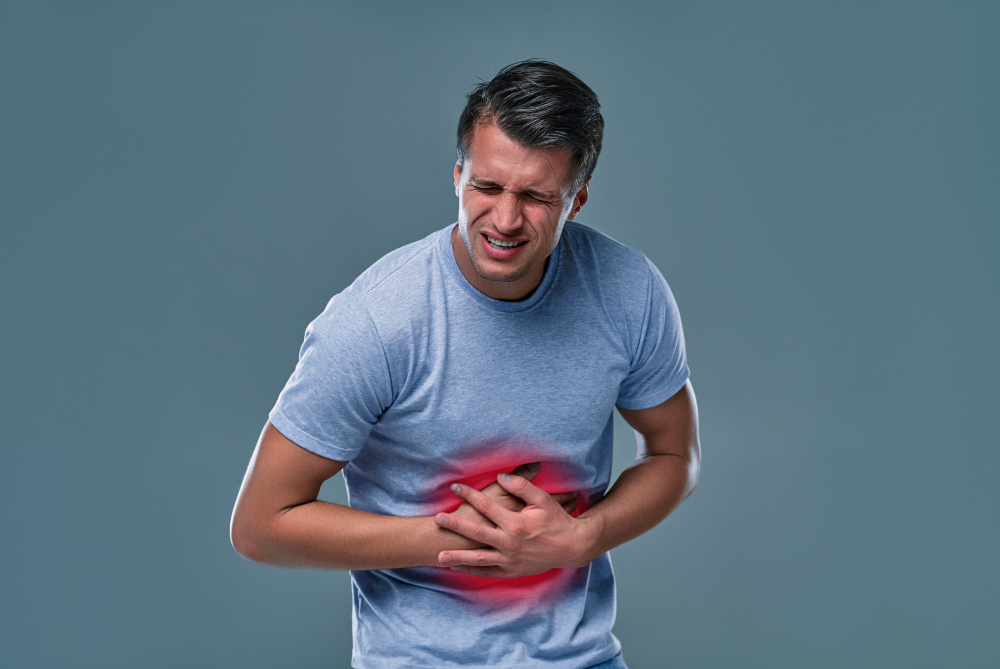Abdominal pain is a common symptom caused by a variety of conditions. While most cases of abdominal pain are not severe and can be easily treated, it’s important to recognize when it may be a sign of a more life-threatening condition, such as colon cancer.
This article explores the link between abdominal pain and colon cancer and discusses how abdominal pain services can help you get the care you need.
Understanding Colon Cancer
Colorectal cancer, commonly known as colon cancer, is a malignancy that affects the colon and rectum. It is the third most frequently diagnosed cancer in the US and the second most common cause of cancer-related death. The condition typically arises from small, benign polyps on the inner lining of the colon or rectum, which may evolve into cancerous growths that can metastasize to other body areas over time. It is imperative to be aware of this condition’s symptoms and patterns of development to implement early detection and timely treatment measures.

The Link Between Abdominal Pain and Colon Cancer
Abdominal pain is a common symptom of colon cancer. However, it’s important to note that not all cases of abdominal pain are caused by colon cancer. Abdominal pain has several reasons, including indigestion, constipation, and gas. If you experience abdominal pain, pay attention to other symptoms you may be experiencing and your medical history.
Symptoms of Colon Cancer
Blood in the stool
One of the most common symptoms of colon cancer is blood in the stool. This blood can be bright red or dark and tarry. It may be seen on the stool’s surface, toilet paper, or toilet bowl after a bowel movement.
Changes in bowel habits, such as diarrhea or constipation
Colon cancer can also cause changes in bowel habits, such as diarrhea or constipation. You may experience a sudden urge to have a bowel movement or feel like you need to go more frequently than usual.
Unexplained weight loss
Unexplained weight loss is another symptom of colon cancer. If you are losing weight without trying, it could be a sign that something is wrong with your body, and you should see a doctor.
Fatigue
Colon cancer can cause fatigue – extreme tiredness or weakness. This fatigue may be caused by anemia or by cancer itself.
Anemia
Anemia is a medical condition in which your body does not have enough red blood cells. This can be caused by colon cancer, which can bleed into the intestine and cause blood loss.
A feeling that your bowel doesn’t empty completely
Colon cancer can cause a feeling that your bowel doesn’t get empty after passing stool. This feeling is known as tenesmus and is caused by a blockage in the intestine.
Rectal bleeding
Rectal bleeding is another common symptom of colon cancer. It may be bright red or dark and tarry and can occur during or after a bowel movement. Rectal bleeding can also be a sign of other conditions, so it’s crucial to get examined if you face this symptom.
In addition to these symptoms, some people with colon cancer may experience abdominal pain, cramping, or bloating. These symptoms can be caused by the tumor growing in the intestine and causing a blockage or inflammation.
However, these symptoms are shared by other illnesses, including hemorrhoids, irritable bowel syndrome, and inflammatory bowel disease. If you experience these symptoms, see a doctor to rule out colon cancer or other severe illnesses. It’s important to note that colon cancer can be asymptomatic in its early stages; regular screenings are recommended for people at average risk starting at age 45. Screenings can help detect colon cancer early when it’s more treatable and often curable.
If you have a family history of colon cancer or other risk factors, such as inflammatory bowel disease or a genetic syndrome, start screening earlier or have more frequent screenings. Talk to your doctor about your risk and when to begin screening.
Abdominal Pain Services
If you’re experiencing abdominal pain, prompt medical attention is a must. Emergency clinics are equipped with state-of-the-art technology and staffed by experienced healthcare professionals who can diagnose and treat the underlying cause of your discomfort. Upon arrival, a healthcare professional will evaluate your medical history, perform a physical examination, and order diagnostic tests to determine the root of your abdominal pain. Once diagnosed, your healthcare provider will work with you to develop a personalized treatment plan to ease your symptoms and promote healing. Don’t hesitate to seek help if you’re experiencing abdominal pain – prompt treatment can make all the difference.

Preventing Colon Cancer
While not all cases of colon cancer can be prevented, several steps can reduce your risk of developing the disease. Some ways to reduce your risk of colon cancer include:
- Eating a diet that is high in fiber and low in fat
- Exercising regularly
- Maintaining a healthy weight
- Not smoking
- Drinking alcohol in moderation
- Getting screened for colon cancer regularly, starting at age 50 (or earlier if you have a family history of colon cancer)
Following these steps reduces your risk of colon cancer and other severe medical conditions.
Abdominal pain is a common symptom with several potential causes, including colon cancer. If you are experiencing abdominal pain, pay attention to other associated symptoms and your medical history, as prompt medical attention may be necessary. It’s crucial to recognize potential connections to colon cancer and seek immediate medical attention if required. By seeking care at Emergency Care of Floresville, you can receive effective treatment promptly to assist with your recovery. Additionally, by prioritizing practices that minimize your risk of colon cancer and other grave health conditions, you can live a life of good health and longevity.

